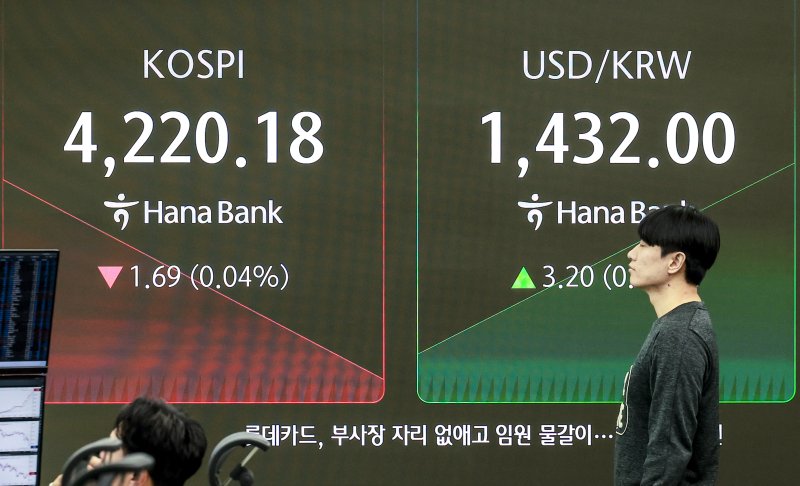KOSPI Drops Over 2% Amid Foreign Selling and Soaring Exchange Rates [fn Afternoon Market Report]
- Input
- 2025-11-04 14:17:01
- Updated
- 2025-11-04 14:17:01

[Financial News] The Korea Composite Stock Price Index (KOSPI) is extending its losses due to continued foreign selling and a rising exchange rate. In contrast, the Korean Securities Dealers Automated Quotations (KOSDAQ) is up by 1.8%, led by strength in bio-related stocks.
According to the Korea Exchange (KRX), as of 2:05 p.m. on the 4th, the KOSPI was trading at 4,137.50, down 84.39 points (-2.00%) from the previous day. The index opened at 4,219.24, a decrease of 2.63 points (0.06%), and losses deepened as large-cap stocks such as Samsung Electronics and SK hynix declined sharply.
On the main board, individual investors made net purchases of 2.9721 trillion won, while foreigners and institutions recorded net sales of 2.252 trillion won and 699.1 billion won, respectively.
By sector, paper & wood (1.27%), pharmaceuticals (1.21%), and food & tobacco (1.17%) showed gains, while securities (-4.60%), transportation equipment & parts (-3.37%), and electrical & electronics (-3.36%) declined.
Among the top 10 stocks by market capitalization, most posted significant declines. Samsung Electronics fell 3.60%, SK hynix dropped 5.00%, Hyundai Motor lost 4.63%, and HD Hyundai Heavy Industries tumbled 6.26%. On the other hand, KB Financial Group rose 2.20%, LG Energy Solution gained 0.42%, and Doosan Enerbility edged up 0.11%.
Meanwhile, the KOSDAQ is showing strength. It is currently trading at 931.68, up 17.13 points (1.87%) from the previous session. Foreign investors and institutions have net purchased 103.9 billion won and 156.8 billion won, respectively, while individuals have net sold 238.9 billion won.
Lee Jae-won, a researcher at Shinhan Securities, explained, "After large-cap semiconductor stocks hit record highs, profit-taking led to downward pressure on the index. The absence of major events such as technology transfer (L/O) and concentrated demand for large-cap semiconductors previously caused relative weakness in KOSDAQ, but now bio stocks are rising."
koreanbae@fnnews.com Ba Han-geul Reporter